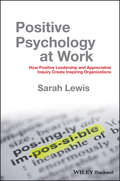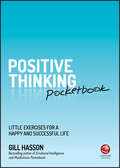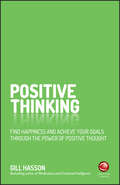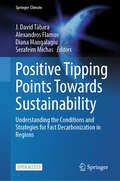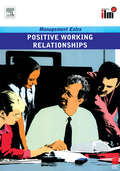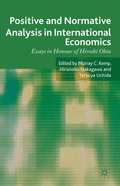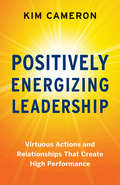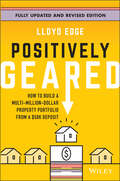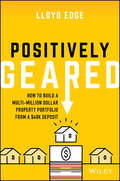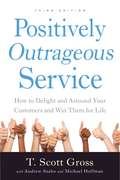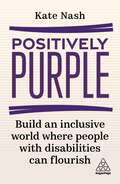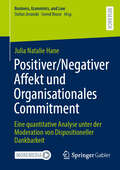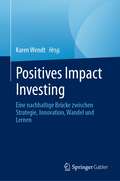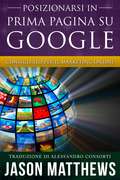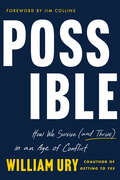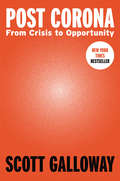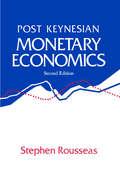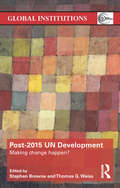- Table View
- List View
Positive Psychology at Work
by Sarah LewisPositive Psychology at Work brings the fields of positive psychology and appreciative inquiry together for the first time to provide leaders and change agents with a powerful new approach to achieving organizational excellence.Draws together positive psychology and appreciative inquiry in the context of leadership organizational challenges for the first timePresents academically rigorous and referenced material in a jargon-free, accessible mannerArranged with chapters focused on specific organizational challenges to allow readers to quickly find ideas relevant to their unique situationFeatures short contributions from experienced practitioners of positive psychology and Appreciative Inquiry, and includes case studies from the UK, Europe, Australia and the USA??
Positive Sport Organizational Insights (Sport Business Insights)
by Minjung Kim Brent D. Oja Christos AnagnostopoulosThis book is a concise and accessible introduction to positive organizational behavior in sport, a new and dynamic approach to sport management. Clearly explaining core concepts, including the central concept of psychological capital, the book shows how ‘positive sport organizations’ (PSO) can deliver improved performance and enhance employee well-being. Standing at the intersection of positive psychology and theories of organizational behavior, the PSO approach focuses on the development of the person within the organization – their human strengths and psychological capacities – in contrast to traditional approaches that have a more limited emphasis on human capital or social capital. The book takes a close look at attributes including passion, grit, and a capacity for innovation, that characterize the effective employee in the modern, fast-paced sport business environment and that can be developed through PSO, and it explains how employee flourishing and corporate social responsibility programmes can be mutually reinforcing. With examples and cases from contemporary sport business in every chapter, this is illuminating reading for any student, researcher, policy-maker or practitioner with an interest in sport business and management, organizational behavior, corporate social responsibility, human resource management, or human flourishing.
Positive Thinking Pocketbook: Little Exercises for a Happy and Successful Life
by Gill HassonThink your way to a more positive life Positive thinking is an approach and a set of skills that we can all learn. But it’s not just about how and what you think; you’ve got to do something! In a range of situations, positive thinking needs to be followed by positive action. The good news is that whatever life has thrown at you in the past and whatever is you want to achieve in the future, the Positive Thinking Pocketbook will help you think and behave more positively. Inside, you’ll find out how to use tips, techniques and advice on creating a positive mindset and developing your positive thinking. Next, you’ll find out how to apply that positive thinking to a range of potentially difficult situations. • Little approachable exercises make it easy to get started • Full of scenarios, ideas, advice, tips and techniques • Learn how to overcome negative thinking, get motivated and stay motivated • Discover how to make positive thinking a habit Whenever you want a shot of positivity, simply pick out a few ideas, tips and techniques that appeal to you and give them a try!
Positive Thinking: Find happiness and achieve your goals through the power of positive thought
by Gill HassonBestselling author Gill Hasson is back to help you learn how the power of positive thinking can change your life Are you stuck in a rut? Do you feel plagued by negative thoughts and emotions every day? Gill Hasson, the bestselling author of Mindfulness and Emotional Intelligence, is back to help you move on from those pesky negative emotions and focus on the positive instead. Gill's practical and reassuring approach to the benefits of positive thinking will have you applying it to your own life every day. If you struggle to see past setbacks both at work and at home, it can be tricky not to let those negative emotions affect you in every area of your life. This book will give readers the tools to view life with a positive outlook and charge ahead in achieving goals that once seemed out of reach. Learn how to: Identify the triggers for negative thoughts and understand how to turn them into positive ones Deal with setbacks and make the most out of negative situations Improve your happiness by accepting situations and learning how to move forward Understand how the power of positive thinking can help you achieve your goals The power of positive thinking is not a new idea; it's been around long enough to become almost a cliché, but there's a reason behind its longevity: positivity works. This book shows you how to break through the clouds today, and start working toward the life you want.
Positive Tipping Points Towards Sustainability: Understanding the Conditions and Strategies for Fast Decarbonization in Regions (Springer Climate)
by J. David Tàbara Alexandros Flamos Diana Mangalagiu Serafeim MichasThis open access book provides the first comprehensive review of the state of the art of social tipping points applied to energy systems from a social interdisciplinary perspective. It does so by presenting a novel theory of systemic and transformative change, linking it to empirical cases assisted with relevant assessment methodologies, including modeling. The authors unveil the narratives and visions, the transformative capacities as well as deliberate strategies and collective actions that at one point in time have been able - or were prevented - to tip a given social-ecological system towards low-carbon, sustainable trajectories in diverse high-intensive carbon regions around the world. This volume shows that self-reinforcing learning feedbacks connecting transformative solutions and strategies across scales and domains can be induced by targeted policy interventions both in local and regional contexts. It further indicates how changes in behavioral patterns, supported by good governance of disruptive technologies, carbon (dis)investment and finance processes as well as new forms of civic engagement, can create the necessary transformative enabling conditions for the emergence of positive tipping points towards low-carbon sustainable futures. The book is a must-read for students, researchers, and scholars, as well as policy-makers and practitioners interested in a better understanding of sustainability, climate, and energy issues and in assessing the potential impacts and effectiveness of strategic interventions aimed at accelerating just sustainable decarbonization processes.
Positive Tourism (Routledge Advances in Tourism)
by Mihaly Csikszentmihalyi Jennifer Laing Sebastian FilepTourism affects millions of individuals, numerous societies and environments in multiple, nuanced and overlapping ways. While it can be viewed as a frivolous leisure pursuit or simply a large industry, with potentially destructive impacts, it might also be understood in terms of its effects on human fulfilment, the good life and greater well-being. This book calls for positive tourism, principally grounded in theories from positive psychology (the study of what makes life worth living), and the development of a body of knowledge that explains what characterises optimal tourist experiences, what enables host communities to flourish and what encourages workers in tourism to thrive. Through original research studies reported in this international volume we aim to further develop this knowledge. The intersections between ongoing and traditionally inspired applications of psychology in tourism and this new thrust in psychological inquiry promise to refresh and challenge tourism research. This book will appeal to researchers and academics in tourism, leisure, positive psychology, management and related fields as well as graduate students, professionals and policy makers.
Positive Working Relationships: Revised Edition (Management Extra)
by ElearnStuck for ideas, inspiration or just want to work differently? Management Extra brings all the best management thinking together in one package.The books are practical and well structured to provide an in depth treatment of these management topics. Titles in the series: * Business Environment * Change Management * Development for High Performance * Effective Communications * Financial Management * Information and Knowledge Management * Leadership and Management in Organisations * Leading Teams * Making Sense of Data and Information * Managing Markets and Customers * Managing for Results * Managing Health, Safety andWorking Environment * Managing Legal and Ethical Principles * Managing Yourself * PositiveWorking Relationships * Project Management * Quality and Operations Management * Reaching Your Goals Through Innovation * Recruitment and Selection * Reputation Management This series fuses key theories and concepts with applied activities to help managers examine how they work in practice.The books are created with individuals in mind.They are designed to help you improve your management skills. Management Extra can also be used in conjunction with management programmes of study aligned to standards. Each of the books has case studies, self assessments and activities all underpinned by knowledge and understanding of the frameworks and techniques required to improve performance. Management Extra provides managers and trainers with a handbook for action and development. You found it – what a find! A practical resource packed with all the relevant theory and suggested activities to support your professional development. An essential resource to have at your fingertips, jump in and enjoy. Russell Jeans Learning and Development Manager, ntl All the essential concepts are here, presented in an easily digestible format with lots of up to date case studies and references – but, most importantly, with plenty of thought provoking activities and self-diagnostic exercises to make the learning personal and transferable.
Positive and Normative Analysis in International Economics
by Murray Kemp Hironobu Nagakawa Tatsuya UchidaThis volume addresses important issues in international economics with contributions from an array of prominent researchers a manifestation of Hiroshi Ohta's cross-border research network and his passionate dedication to economics. Contributions range from studies on positive and normative trade theory, innovation in international trade and interactions between domestic and foreign firms and industries, to studies of a more empirical nature. The empiricalcontributions focus on preferential trading arrangements, global imbalances and exchange rates, as well asprovidingan in-depth analysis of the Japanese economy. The featured topics are explored from both positive and normative perspectives. Positive analysis describes how the economy functions, dealing primarily with what 'is'. Normative analysis is concerned with what 'should be'. This combined approach enables the formation of a base from which credible policy evaluation can take place. "
Positively Energizing Leadership: Virtuous Actions and Relationships That Create High Performance
by Kim CameronThis practical guide, the first to show how leaders can achieve extraordinary results through the positive energy generated by virtuous interactions with employees, is written by one of the giants in the study of positive leadership. This book reveals one of the most important but frequently ignored factors that lead to spectacular performance in organizations. Kim Cameron, a true pioneer in the study of positive leadership, offers validated scientific evidence that all individuals are inherently attracted to and flourish in the presence of positive energy, a principle known in biology as heliotropism. Further, he shows that the positive relational energy generated by leaders' virtuous behaviors—such as generosity, compassion, gratitude, trustworthiness, forgiveness, and kindness—is tightly linked to extraordinary organizational outcomes like greater innovation, higher profits, and increased engagement and retention. Cameron has not written a feel-good tome about the power of positive thinking, "happiology," or unbridled optimism. This research-based explanation shows how to achieve performance that exceeds expectations. He provides practical suggestions, assessments, and exercises showing how leaders can improve their own positive energy and increase positive relational energy in their organizations. Positively Energizing Leadership is a major contribution to the theory and practice of leadership.
Positively Geared: How to Build a Multi-Million-Dollar Property Portfolio from a $50K Deposit
by Lloyd EdgeThe bestselling property investing guide — now fully revised and updated with the latest numbers and locations What if you could make money when you buy a property — not just when you sell one? Positively Geared offers a powerful, sustainable approach for clever property investment that will help you grow your equity and cash flow. This bestselling guide to wealth building — now fully updated for the current property market — will equip you with knowledge, skills and insider strategies for building a diverse property portfolio. You’ll discover how smarter investing can help you create passive income and achieve financial freedom sooner. Working as a teacher, author Lloyd Edge began his journey toward financial independence with only an initial $30k investment. By the age of 40, Lloyd was able to retire from his nine-to-five job. Now a leading buyer’s agent and property investment strategist, Lloyd shares his personal story and proven strategies in Positively Geared. His goal? To inspire and empower everyday Aussies — at any age — to dream big and proactively craft the lifestyle they really want. With Positively Geared, you’ll: discover tried-and-tested strategies for today’s booming property market, including duplex development understand the importance of growth, instant equity and cash flow learn from real-life case studies and interactive exercises that show you how to analyse different properties and locations for successful investing craft and employ a strategy designed for building a profitable portfolio create a personal plan to achieve financial freedom through real estate investing. Whether you're a new or experienced property investor, you can take advantage of this book’s unique approach to building sustainable wealth. Positively Geared will show you how to refocus your objectives, take control of your finances and start building your dreams.
Positively Geared: How to Build a Multi-million Dollar Property Portfolio from a $40K Deposit
by Lloyd EdgeFast-track your financial dreams with this Aussie property investment guide for the 2020s Positively Geared offers a powerful approach for clever property investment, empowering readers to make money when they buy properties, not just when you sell them. This sustainable approach to wealth building will equip you with the knowledge, skills and insider strategies to not only build a diverse property portfolio, but also maintain a portfolio that achieves passive income to reach your goal of financial freedom. Working as a teacher, author Lloyd Edge started to grow his wealth with an initial $30k investment. By the age of 40, he was able to retire from his nine-to-five job. Now a leading property investment strategist, Lloyd’s shares his personal story and proven strategies with the hope of inspiring everyday Aussies – young and old – to dream big and proactively craft the lifestyle they really want. Positively Geared will enable you to: • Discover tested property investment strategies• Learn from real-life case studies and interactive exercises • Understand the importance of growth, instant equity, and cash flow when buying properties• Employ a strategy designed for property portfolio growth• Create a plan to achieve financial freedom based on real estate investment Whether you’re a new or experienced property investor, you can take advantage of this unique approach to sustainable wealth building and take control of your finances, refocus on your objectives and start designing the lifestyle you want.
Positively Outrageous Service: How to Delight and Astound Your Customers and Win Them for Life
by T. Scott GrossIn today’s tough economy, cutting prices and providing good service aren’t enough. To be truly successful, innovative businesspeople must learn the art of Positively Outrageous Service (POS)-doing the unexpected unexpectedly and giving the customer more than he or she could hope for. POS put customer service guru T. Scott Gross on the map in the early 1990s. In this revised third edition, he contemporizes his work by examining what’s wrong in the service industry today and how to turn those negatives into POS. In his signature, slightly irreverent, but always insightful style, he shows managers at every level of the service industry how to:Build a customer base by following the four key principles of promotions-have fun, get people to your store, get people involved with your product, and do something good for othersHire the right people and show them the fundamentals of POSEnergize and obtain the most creativity out of employeesWin over customers when mistakes happen, no matter who is at faultPOS is not just a way of doing business, according to Gross; it’s also a state of mind and the key to success in the twenty-first century. T. Scott Gross is a consumer advocate whose client roster for consulting, training, and speaking reads like a who’s who of the Fortune 500. Countless businesses, including Southwest Airlines, FedEx, McDonald’s, Sears, and Wal-Mart, have asked him to motivate the troops at sales meetings and conferences worldwide.Allworth Press, an imprint of Skyhorse Publishing, publishes a broad range of books on the visual and performing arts, with emphasis on the business of art. Our titles cover subjects such as graphic design, theater, branding, fine art, photography, interior design, writing, acting, film, how to start careers, business and legal forms, business practices, and more. While we don't aspire to publish a New York Times bestseller or a national bestseller, we are deeply committed to quality books that help creative professionals succeed and thrive. We often publish in areas overlooked by other publishers and welcome the author whose expertise can help our audience of readers.
Positively Purple: Build an Inclusive World Where People with Disabilities Can Flourish
by Kate NashMost employers will have a workforce where at least 10% of their people will have a visible or invisible disability. And 86% of all disabled people acquire their disability during the course of their working lives. How can businesses create strategies and a company culture that includes all staff?Ensure that your company or organization doesn't become guilty of the soft bigotry of low expectations when it comes to disabled employees and customers. Learn from your disabled staff and consumers and be equipped to be a better and more dynamic organization.Kate Nash, founder of #PURPLELIGHTUP - a global movement which celebrates the economic contribution of employees with disability - will help you understand how any organization can ensure disabled staff and consumers are included and valued. Telling a fascinating story of how to make change happen and recognizing that any kind of transformation requires knowledge, determination and hard yards of campaigning, networking and deal making, you will learn how to build disability confidence throughout your organization.Positively Purple allows disabled workers to claim their rightful place centre stage as just another valuable member of the team.
Positively Speaking: The Art of Constructive Conversations with a Solutions Focus
by Paul Z. Jackson Janine WaldmanSolution Focused approaches can help unlock the most challenging aspects of executive leadership in the modern public sector. Jackson and Waldman's approach instils the discipline of simplicity and builds confidence through positive enquiry.
Positiver/Negativer Affekt und Organisationales Commitment: Eine quantitative Analyse unter der Moderation von Dispositioneller Dankbarkeit (Business, Economics, and Law)
by Julia Natalie HaneDie Mitarbeiterbindung ist in einem von Fachkräftemangel und Fluktuation geprägten Arbeitsmarkt entscheidend. Organisationales Commitment spielt eine Schlüsselrolle für die Leistung und Bindung der Mitarbeitenden. In diesem Buch wird der Zusammenhang von Positivem und Negativem Affekt mit Organisationalem Commitment unter dem Einfluss Dispositioneller Dankbarkeit untersucht. Eine quantitative Primäranalyse mit 297 Teilnehmenden und einem Durchschnittsalter von 41 Jahren wird durchgeführt. Die Ergebnisse zeigen signifikante positive Zusammenhänge zwischen Positivem Affekt und Affektivem Commitment sowie Negativem Affekt und Kalkulatorischem Commitment. Mediierende Effekte von Dankbarkeit und Affekt sind nachweisbar, während kein moderierender Effekt von Dankbarkeit festgestellt wird. Praxisempfehlungen legen nahe, ein unterstützendes Umfeld zu schaffen, das die emotionale Bindung der Mitarbeitenden stärkt. Die Integration von Dankbarkeit in die Unternehmenskultur wird empfohlen, um Mitarbeiterwohlbefinden, Teamdynamik sowie Gesamtzufriedenheit zu verbessern. Maßnahmen zur Förderung einer ausgewogenen Affektbalance sollen ein gesundes emotionales Klima schaffen und die individuelle Zufriedenheit sowie Gesamtproduktivität fördern.
Positives Impact Investing: Eine nachhaltige Brücke zwischen Strategie, Innovation, Wandel und Lernen
by Karen WendtDieses Buch veranschaulicht die Auswirkungen, die eine Konzentration auf ökologische und soziale Themen sowohl auf die Risikominderung von Anlagen als auch auf die Förderung von Innovationen hat. Die Einbeziehung der Auswirkungen als neuer Eckpfeiler des Anlagedreiecks erfordert, dass Investoren und Kunden ihre Interessen und Werte aufeinander abstimmen und die Bedürfnisse verstehen. Dieser Abstimmungsprozess fungiert als Katalysator für die Veränderung der Organisationskultur innerhalb einer Organisation und initiiert somit die externe Wirkung der Organisation, aber auch ihre interne Veränderung, die wiederum die Schaffung von Wirkung verstärkt. Das Buch beschreibt, wie Kultur der soziale Klebstoff ist, der alle Disziplinen einer Organisation durchdringt, und zeigt auf, wie eine organisatorische Ausrichtung erreicht werden kann, um strategische Schnelligkeit, Innovation und Lernen zu ermöglichen, und liefert Beispiele dafür, wie Wirkung erzielt und Mitarbeiter mobilisiert werden können. Es konzentriert sich insbesondere auf Impact Investing, Impact Entrepreneurship, Innovation, De-Risking-Asset, grüne Investitionslösungen und Investorenbewegungen, um dem Klimawandel entgegenzuwirken und die Ziele für nachhaltige Entwicklung der Vereinten Nationen umzusetzen, und beleuchtet dabei Kultur, Kommunikation und Strategie.
Posizionarsi in Prima Pagina su Google - Consigli SEO per il Marketing Online
by Jason Matthews Alessandro ConsortiArrivare in prima pagina su Google tramite facili suggerimenti SEO. Semplicemente tramite il SEO (search engine optimization) si può far arrivare qualsiasi sito in cima, senza spendere soldi. Scoprite nuovi modi di usare le parole chiave, i meta description ed i tag, categorie/etichette, titoli, costruzione di link ed altro. Istruzioni dettagliate per aiutare il vostro sito a raggiungere la prima pagina di Google. Tutti possono farcela. Non costa nulla a parte un po' di tempo. Scoprirete: *le migliori parole chiave, sia di tipo short-tail che long-tail *meta tag con meta description nel sorgente della pagina *modi di ottimizzare testo ed immagini *collegamenti URL di ritorno verso altri siti *come monitorare le tendenze dei visitatori *piattaforme online e come incrementare la visibilità *strumenti per il social media (Google Plus, Facebook, Twitter, ecc.) *come collegarsi con persone di tutto il mondo *molto altro... In un periodo che va da poche settimane a qualche mese, vedrete risultati reali ed arriverete in prima pagina. Argomenti trattati: SEO, suggerimenti SEO, Google, Google AdWords, ottimizzazione dei motori di ricerca, marketing online, business online, internet marketing, internet business, e-commerce, e-business, parole chiave, keyword planner, ricerca delle parole chiave, blog, blogging, AdWords, Bing
Posse Foundation: Developing Strong Leaders from Diverse Backgrounds
by John J-H Kim Julia Kelley Robin MendelsonFounded in 1989, Posse Foundation was a nonprofit organization with a mission of developing future leaders who reflected the U.S.'s rich diversity. The organization ran a selective, localized admissions process in 10 U.S. cities to identify outstanding students with leadership potential, known as Posse Scholars. Then, it placed them in "posses" - groups of 10 Scholars from the same city - at selective U.S. higher education institutions, which agreed to provide full tuition to all selected Scholars. Although Posse did not screen applicants for race or financial need, it focused selection efforts in areas with racial and socioeconomic diversity. Posse received national recognition and expanded considerably in the decades after its founding, but by 2020 its growth had started to plateau. In 2020, during the COVID-19 pandemic, Posse signed up several new partners, driven in part by a new, virtual selection option that could find Scholars from locations beyond the cities where Posse maintained brick-and-mortar offices. The virtual option might help Posse scale, but it was not yet clear whether bringing together Scholars from different places versus from the same city would have any implications for the program's effectiveness. Looking ahead, Posse Founder and CEO Deborah Bial considered how to continue Posse's momentum and sign up more institutional partners. Posse focused exclusively on roughly 150 of the most selective colleges and universities, and some prospective partners were unwilling or unable to work with Posse unless it only selected students with financial need. Expanding the list of potential partners or adding a financial need screen might yield more partnerships, but Bial and the rest of the Posse team believed that working with selective institutions and being solely merit-based were key parts of Posse's identity and its ability to achieve its mission. How could Posse best position itself for continued scaling?
Possessors and Possessed: Museums, Archaeology, and the Visualization of History in the Late Ottoman Empire
by Wendy M. K. ShawA history of the creation of museums in Ottoman Turkey, which demonstrates that museum-building was both a product of and a response to European imperialism.
Possible: How We Survive (and Thrive) in an Age of Conflict
by William UryThe author of the world’s best-selling book on negotiation draws on his nearly fifty years of experience and knowledge grappling with the world’s toughest conflicts to offer a way out of the seemingly impossible problems of our time. Conflict is increasing everywhere, threatening everything we hold dear—from our families to our democracy, from our workplaces to our world. In nearly every area of society, we are fighting more and collaborating less, especially over crucial problems that demand solutions.With this groundbreaking book, bestselling author and international negotiator William Ury shares a new “path to possible”—time-tested practices that will help readers unlock their power to constructively engage and transform conflict. Part memoir, part manual, part manifesto, Possible offers stories and sage advice from Ury’s nearly 50 years of experience on the front lines of some of the world’s toughest conflicts.One of the world’s top experts in the field, Ury has worked on conflicts ranging from boardroom battles to labor strikes, from the US partisan divide to family feuds, from wars in the Middle East, Colombia and Ukraine to helping the US and USSR avoid nuclear disaster. Now, in Possible, he helps us tackle the seemingly intransigent problems facing us.In Possible, Ury argues conflict is natural. In fact, we need more conflict, not less—if we are to grow, change, evolve and solve our problems creatively. While we may not be able to end conflict, we can transform it—unleashing new, unexpected possibilities.Successfully tested at Harvard University with almost a thousand participants from business, government, academia, and the nonprofit sector, Ury’s “Path to Possible” proved so valuable that Harvard’s Program on Negotiation selected it as its inaugural online daylong in April 2022.Possible introduces Ury’s methods and makes them available for everyone. Combining accessible frameworks and powerful storytelling and offering dozens of examples, it is an essential guide for anyone looking to break through the toughest conflicts—in their workplace, family, community or the world.
Post Carbon Reader: Managing the 21st Century's Sustainability Crises
by Richard Heinberg Daniel LerchHow do population, water, energy, food, and climate issues impact one another? What can we do to address one problem without making the others worse? The Post Carbon Reader features essays by some of the world's most provocative thinkers on the key issues shaping our new century, from renewable energy and urban agriculture to social justice and community resilience. This insightful collection takes a hard-nosed look at the interconnected threats of our global sustainability quandary and presents some of the most promising responses. Book jacket.
Post Corona: From Crisis to Opportunity
by Scott Galloway"This is as good an analysis as you could wish to read." --The Financial TimesFrom bestselling author and NYU Business School professor Scott Galloway comes a keenly insightful, urgent analysis of who stands to win and who's at risk to lose in a post-pandemic worldThe COVID-19 outbreak has turned bedrooms into offices, pitted young against old, and widened the gaps between rich and poor, red and blue, the mask wearers and the mask haters. Some businesses--like home exercise company Peloton, video conference software maker Zoom, and Amazon--woke up to find themselves crushed under an avalanche of consumer demand. Others--like the restaurant, travel, hospitality, and live entertainment industries--scrambled to escape obliteration.But as New York Times bestselling author Scott Galloway argues, the pandemic has not been a change agent so much as an accelerant of trends already well underway. In Post Corona, he outlines the contours of the crisis and the opportunities that lie ahead. Some businesses, like the powerful tech monopolies, will thrive as a result of the disruption. Other industries, like higher education, will struggle to maintain a value proposition that no longer makes sense when we can't stand shoulder to shoulder. And the pandemic has accelerated deeper trends in government and society, exposing a widening gap between our vision of America as a land of opportunity, and the troubling realities of our declining wellbeing.Combining his signature humor and brash style with sharp business insights and the occasional dose of righteous anger, Galloway offers both warning and hope in equal measure. As he writes, "Our commonwealth didn't just happen, it was shaped. We chose this path--no trend is permanent and can't be made worse or corrected."
Post Keynesian Monetary Economics
by RousseasDuring the past five years, crises in the US savings and loan industry, commercial banks, and other financial institutions have borne out the ideas that Rousseas expressed in the first edition. His main theme stresses the role of innovation in the financial sector of the economy and its implications for control of the money supply and credit, as well as the larger issue of macroeconomic policy. He holds a Post-Keynesian view of an elastic and endogenous money supply that is largely founded on the "general liquidity thesis" of the Radcliffe Committee. Indeed, the elasticity of the credit structure is even greater than the Radcliffe Committee originally claimed. Tables and charts are revised through 1990, and the text has been revised accordingly. An expanded preface to the revised edition makes this book very relevant to contemporary problems and policy.
Post Pandemic Facilitation of Air Transport: LEGAL, POLITICAL AND ECONOMIC ASPECTS
by Ruwantissa AbeyratneFrom early 2020 for a period of two years at the end of which this book was written, air transport suffered unprecedented setbacks due to the COVID-19 pandemic. Although the pandemic may eventually fizzle out into another flu like occurrence, the restraint with which air transport services were offered would remain with us for a while with some practices being sustained, particularly those pertaining to public health. One of the main areas of air transport that was and will be affected significantly by the changed circumstances - is facilitation – a subject that is regulated by the Chicago Convention of 1944 and its Annex 9. This book looks in depth at the Annex as it will be applied in a post pandemic world, against its legal, socio-political, and economic impacts, addressing the Standards of the Annex on clearance of aircraft; entry and departure of passengers; and the carriage of cargo. It also discusses some critical aviation events in 2020 and 2021 that occurred as they relate to facilitation of air transport. Some of the key areas discussed are the role of ICAO; issues of public health as they relate to air transport; security of travel documents; smuggling of persons; digital technology and rights of the passenger; unruly passengers; carriage of disabled passengers; relief flights and repatriation flights; and facilities at airports.
Post-2015 UN Development: Making Change Happen? (Global Institutions)
by Stephen Browne & Thomas G. WeissIn 2000, at the United Nations Millennium Summit, world leaders agreed to the Millennium Declaration. The Declaration included development targets to be reached by 2015, which were to become known as the Millennium Development Goals (MDGs). Progress has been made towards the achievement of the MDGs, but poverty remains widespread. With the terminal year approaching, the international community has begun the process of determining the goals which might follow the MDGs. While the UN is driving the process, there has been very little introspection on its own organizational capacity to help countries to meet the goals and is being increasingly sidelined by other more effective development organizations and initiatives. Based on extensive original research that has critically examined the role and functions of the organizations of the UN development system, this book seeks to capture in a single volume a comprehensive review of the UN’s performance and prospects for development. The contributors each offer extensive experience and familiarity—as practitioners and researchers—with the UN and development; and the book will contribute to the urgently needed debate on the reform of the UN development system at a critical juncture. The main rationale for this book, and its timing, is the unusual opportunity provided by the 2015 threshold to re-think the UN development system and to empower it to support a new development agenda and will be of interest to students, scholars of International Organizations and development studies.
